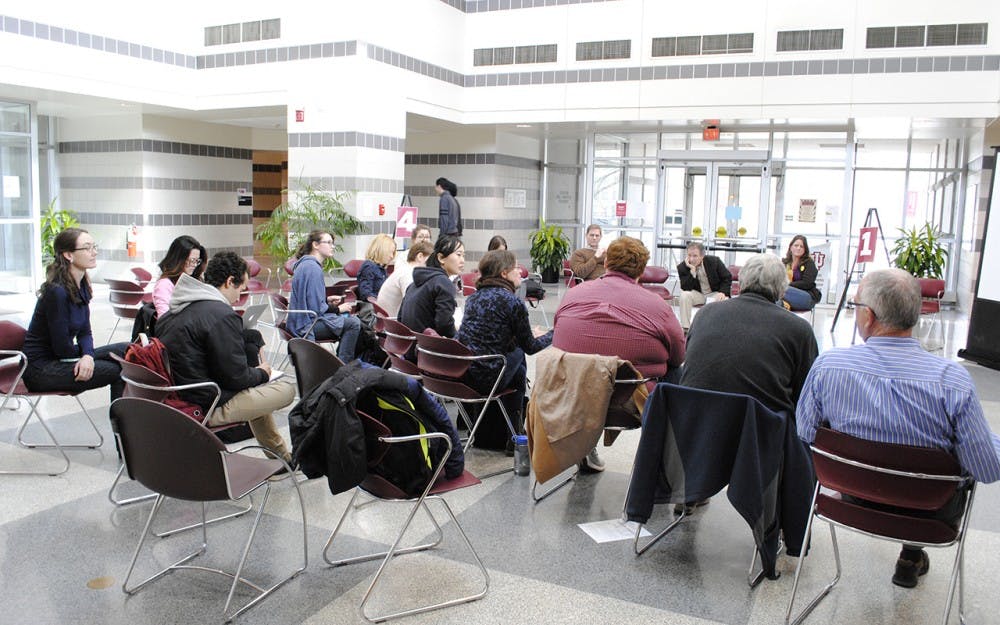Students, faculty and Bloomington residents participated in a teach-in event Wednesday afternoon at the School of Education on the importance of public education in the state of Indiana.
The teach-in was structured by four circles of discussion. Each circle had a presenter who explained the issue they specialized in. On the agenda was school choice, the grading system for schools, the issue of state superintendent being an appointed as opposed to an elected official, and the relationship between Common Core standards and Indiana’s standards for education.
Cathy Fuentes-Rohwer , who chairs Monroe County’s chapter of the Indiana Coalition for Public Education, led a discussion on school choice and voucher programs in the state and explained why she thought they were flawed.
“There’s been a concerted attack on public education in Indiana, specifically since 2011,” Fuentes-Rohwer said.
This is when the state passed its school voucher legislation, which allows students whose families believe they would benefit from alternative education to receive their portion of local public school funding as a coupon applicable to private and charter school tuition. Fuentes-Rohwer said originally this was most likely intended for underprivileged students but now is used by people with a higher household income.
State legislators presented this legislation as opening up a marketplace for education, though Fuentes-Rohwer said these laws were not written by teachers. They were actually drafted by organizations such as the American Legislative Exchange Council, a nonprofit that drafted and sponsored laws such as controversial “stand your ground” and voter identification laws.
A big difference and issue Fuentes-Rohwer said she saw between public schools and charter schools was a level of government oversight. She said charter schools, like the one that occupies her former elementary school in Detroit, operate with impunity of standards and open and close like businesses.
“This is a racket,” Fuentes-Rohwer said, especially because legislators push charter-friendly legislations at the same time as they impliment a grading system that could fail public schools that don’t perform adequately.
She said school is about being with people who are different from you. The problem she said charter schools have is their ability to control who comes in the door and does not.
“I know that I want for my four kids to be critical thinkers,” Fuentes-Rohwer said.
IU junior Walt Click, who directs undergraduate education for the Education Policy Student Association, said he recognizes the importance of public schools but understands why some areas have less productive schools than others.
He studies law and public policy in the School of Public and Environmental Affairs and said he’d like to learn more on the subject of school vouchers before making judgements.
Professor Ashlyn Nelson, an economist of education, led discussions about the federal government’s role in education and the linkage, or the necessity for absence of one, between data on student performance and teacher performance.
Nelson said her testing was about evaluating students, so their test grades should not be a direct reflection on their teachers’ skills. She said in 2001 after No Child Left Behind policies were rolled out, there was an incentive for states to hold their school’s accountable.
She referenced former Florida Gov. Jeb Bush’s A-through-F school rating system, which she said had little consensus before scores were released.
“It had a very interesting implementation history,” Nelson said.
Studies have demonstrated how the grades given to schools did not line up with the the public’s perception of the school’s quality, she said.
Nelson was asked to evaluate school grades in Indiana and was told there were too many B-grade schools. She said there were inconsistencies between the formula’s allocation of grades and the state policy for evaluating the same schools.
In the discussion at the end of the event, Nelson said part of why educators are not consulted on research had to do with the politicization of schools of education on a state and national level. She said since she’s a SPEA professor, legislators ask her questions about education policy, but they normally are turned off when she refers them to the School of Education’s research.
She said a large portion of Indiana’s state legislature tends to dislike schools of education. This is not uncommon for states with Republican super-majorities.
She agreed much of the charter school and voucher legislation was proposed by the formerly mentioned American Legislative Exchange Council, not education researchers who would bring evidence.
Fuentes-Rohwer said while her group has been working to educate people about why public schools are vital to society for years, the nomination of Betsy DeVos as secretary of education definitely pushed the issue to a national level. DeVos is an advocate of the charter schools like the one occupying Fuentes-Rohwer’s old school building in Michigan.
Educating the public about the importance of healthy public schools is more important than ever, she said.
“It’s something everybody needs to learn, and quickly, quickly, quickly,” Fuentes-Rohwer said.






